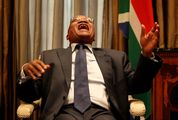LUIZ Inacio Lula da Silva, former president of Brazil, was sworn in as current Brazilian President Dilma Rousseff’s chief of staff yesterday amid nationwide protests, legal challenges and an absent vice-president as the ongoing political crisis paralysing Latin America’s largest nation intensifies.
Flanked by several ministers, the country’s former president and Ms Rousseff’s predecessor signed his acceptance term in a ceremony at the presidential palace, where government supporters chanted "there will be no coup".
Outside the palace in Brasilia, the country’s capital, and in cities including Rio de Janeiro and Sao Paulo, thousands of protesters gathered demanding the president’s resignation and Mr Lula’s arrest.
"Current circumstances give me the magnificent chance of bringing to my government the biggest political leader in this country," Rousseff said in her speech. "Coup supporters won’t bring me to my knees," she said.
Vice-president Michel Temer skipped the ceremony, increasing speculation his PMDB party, the largest in the government alliance, would leave the ruling coalition.
Tensions escalated on Wednesday after Federal Judge Sergio Moro released phone recordings that, according to critics, suggest Ms Rousseff appointed Mr Lula to shield him from a wide criminal probe on kickback schemes at state-run oil company Petrobras, dubbed Carwash.
The conversation between Ms Rousseff and Mr Lula that were obtained through a police wire tap, were aired on television and sparked demonstrations throughout Brazil.
Financial markets rallied yesterday on bets that impeachment proceedings against Ms Rousseff would regain momentum, with the Brazilian real rallying 2% to 3.67/$.
In one of the recordings, Ms Rousseff said she was sending Mr Lula a document confirming his appointment to her cabinet and that he should use it only when needed.
The conversation increased speculation that Ms Rousseff was protecting her predecessor, as ministers have special legal status and can only be indicted by the Supreme Court.
In another chat with Ms Rousseff’s former chief of staff, Jaques Wagner, Mr Lula asked for the president to intervene with a Supreme Court justice on his behalf.
The presidential palace criticised Judge Moro’s decision to publish the recordings, saying it was an affront to the rights and guarantees given to the head of state. Mr Lula’s lawyer, Cristiano Zanin, said on GloboNews the judge was trying to cause social upheaval, without commenting on the content of the discussions.
Prosecutors had sought a warrant for Mr Lula’s arrest after charging him last week with money laundering and making false declarations.
A state judge who was considering the request deferred the decision to Judge Moro on Monday.
The former president has repeatedly denied wrongdoing.
Ms Rousseff told reporters on Wednesday that she nominated Mr Lula to bolster her government as it tries to revive the economy, denying allegations she was protecting him from Judge Moro.
"I don’t understand, when people talk about this case, they create this theory" that Mr Lula is hiding from the investigation, she said.
"Let’s be frank here. Lula strengthens my government, and there are people who don’t want him to do that."
Lower house speaker Eduardo Cunha, meanwhile, said impeachment would move ahead without delay, pledging to hold a vote within 45 days. Earlier on Wednesday, the Supreme Court ruled on procedural issues that had frozen the process since December.
In a further sign that support for Ms Rousseff was crumbling, the PRB party on Wednesday said it would abandon the ruling coalition.
Another party, the PSB, joined the opposition early this month.
Ms Rousseff’s largest coalition partner in congress, the PMDB, is set to decide within 30 days whether to stay in the ruling alliance.
"The situation is obviously moving to a point of escalation," said Thiago de Aragao, partner and director of strategy at political-risk consulting company Arko Advice.
Naming the iconic Brazilian politician to join her cabinet reflects the dire straits Ms Rousseff is in and runs the risk of failing, as it ties her fate to that of her mentor’s.
It has also spooked investors, who fear she and Mr Lula could resort to economic policies that will help her remain in power, but further deteriorate public accounts.
The disclosure of the conversations by the judge is fuelling outrage among opposition legislators and critics of the government.
Police used tear gas to contain demonstrations that erupted outside the presidential palace in Brasilia.
People calling for Ms Rousseff’s ousting and chanting ," Lula is a thief" flooded Sao Paulo’s main thoroughfare, where about 20,000 people congregated, Epoca magazine said.
Brazilians banged pots and pans in at least several cities, a popular form of protest in the country.
Bloomberg

Opponents of the Brazilian government take part in a protest demanding the resignation of President Dilma Rousseff on March 13, 2016 at the Esplanada dos Ministerios in Brasilia. More than a million people are expected to flood Brazil's streets in massive anti-government protests calling for President Dilma Rousseff's ouster over a corruption scandal and the crumbling economy. Picture:AFP/EVARISTO SA
LUIZ Inacio Lula da Silva, former president of Brazil, was sworn in as current Brazilian President Dilma Rousseff’s chief of staff yesterday amid nationwide protests, legal challenges and an absent vice-president as the ongoing political crisis paralysing Latin America’s largest nation intensifies.
Flanked by several ministers, the country’s former president and Ms Rousseff’s predecessor signed his acceptance term in a ceremony at the presidential palace, where government supporters chanted "there will be no coup".
Outside the palace in Brasilia, the country’s capital, and in cities including Rio de Janeiro and Sao Paulo, thousands of protesters gathered demanding the president’s resignation and Mr Lula’s arrest.
"Current circumstances give me the magnificent chance of bringing to my government the biggest political leader in this country," Rousseff said in her speech. "Coup supporters won’t bring me to my knees," she said.
Vice-president Michel Temer skipped the ceremony, increasing speculation his PMDB party, the largest in the government alliance, would leave the ruling coalition.
Tensions escalated on Wednesday after Federal Judge Sergio Moro released phone recordings that, according to critics, suggest Ms Rousseff appointed Mr Lula to shield him from a wide criminal probe on kickback schemes at state-run oil company Petrobras, dubbed Carwash.
The conversation between Ms Rousseff and Mr Lula that were obtained through a police wire tap, were aired on television and sparked demonstrations throughout Brazil.
Financial markets rallied yesterday on bets that impeachment proceedings against Ms Rousseff would regain momentum, with the Brazilian real rallying 2% to 3.67/$.
In one of the recordings, Ms Rousseff said she was sending Mr Lula a document confirming his appointment to her cabinet and that he should use it only when needed.
The conversation increased speculation that Ms Rousseff was protecting her predecessor, as ministers have special legal status and can only be indicted by the Supreme Court.
In another chat with Ms Rousseff’s former chief of staff, Jaques Wagner, Mr Lula asked for the president to intervene with a Supreme Court justice on his behalf.
The presidential palace criticised Judge Moro’s decision to publish the recordings, saying it was an affront to the rights and guarantees given to the head of state. Mr Lula’s lawyer, Cristiano Zanin, said on GloboNews the judge was trying to cause social upheaval, without commenting on the content of the discussions.
Prosecutors had sought a warrant for Mr Lula’s arrest after charging him last week with money laundering and making false declarations.
A state judge who was considering the request deferred the decision to Judge Moro on Monday.
The former president has repeatedly denied wrongdoing.
Ms Rousseff told reporters on Wednesday that she nominated Mr Lula to bolster her government as it tries to revive the economy, denying allegations she was protecting him from Judge Moro.
"I don’t understand, when people talk about this case, they create this theory" that Mr Lula is hiding from the investigation, she said.
"Let’s be frank here. Lula strengthens my government, and there are people who don’t want him to do that."
Lower house speaker Eduardo Cunha, meanwhile, said impeachment would move ahead without delay, pledging to hold a vote within 45 days. Earlier on Wednesday, the Supreme Court ruled on procedural issues that had frozen the process since December.
In a further sign that support for Ms Rousseff was crumbling, the PRB party on Wednesday said it would abandon the ruling coalition.
Another party, the PSB, joined the opposition early this month.
Ms Rousseff’s largest coalition partner in congress, the PMDB, is set to decide within 30 days whether to stay in the ruling alliance.
"The situation is obviously moving to a point of escalation," said Thiago de Aragao, partner and director of strategy at political-risk consulting company Arko Advice.
Naming the iconic Brazilian politician to join her cabinet reflects the dire straits Ms Rousseff is in and runs the risk of failing, as it ties her fate to that of her mentor’s.
It has also spooked investors, who fear she and Mr Lula could resort to economic policies that will help her remain in power, but further deteriorate public accounts.
The disclosure of the conversations by the judge is fuelling outrage among opposition legislators and critics of the government.
Police used tear gas to contain demonstrations that erupted outside the presidential palace in Brasilia.
People calling for Ms Rousseff’s ousting and chanting ," Lula is a thief" flooded Sao Paulo’s main thoroughfare, where about 20,000 people congregated, Epoca magazine said.
Brazilians banged pots and pans in at least several cities, a popular form of protest in the country.
Bloomberg





















Change: -0.80%
Change: -1.03%
Change: -0.24%
Change: -1.13%
Change: -1.10%
Data supplied by Profile Data
Change: 0.13%
Change: -0.23%
Change: -0.80%
Change: 0.00%
Change: -0.09%
Data supplied by Profile Data
Change: 0.06%
Change: 0.15%
Change: 0.13%
Change: 0.22%
Change: 0.12%
Data supplied by Profile Data
Change: 0.01%
Change: -0.20%
Change: -0.06%
Change: 0.17%
Change: 0.55%
Data supplied by Profile Data